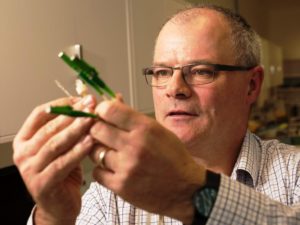
A device leading to better treatment of obstructive sleep apnoea (OSA) and research investigating the risks of intravenous (IV) fluid administration – the most common clinical intervention in developed countries – are among the Flinders University projects receiving significant funding in the latest round of National Health and Medical Research Council grants.
The new ‘multi-modal’ device for diagnosing OSA, funded by a $479,786 NHMRC Development Grant, will identify and characterise the points of airway collapse in sufferers, allowing clinicians to recommend treatment better tailored to each patient.
The new tool will make it easier for clinicians to identify those patients who could be treated with alternatives to the commonly used positive pressure face masks.
Professor John Arkwright is leading a team of six Flinders researchers and one from the University of Western Australia in this initiative, which could lead to a better night’s sleep for OSA sufferers worldwide.
Flinders’ Dr Shailesh Bihari, meanwhile, received a $189,384 Early Career Fellowship for his project: ‘Safer fluid resuscitation – Which (type), what (to expect) and how (mechanisms).’
The funding comes amid growing evidence of an association between fluid resuscitation (intravenous fluid replacement) and worsening oxygenation and increased mortality among patients, alongside differing opinions about the superiority of one fluid type over other.
Dr Bihari’s previous work in the area, in healthy volunteers, demonstrated respiratory dysfunction with minimal effect on cardiac output following intravenous fluid administration. This supports his team’s observation in critically ill patients of worsening oxygenation after fluids were given.
Because fluid resuscitation remains clinically necessary, Dr Bihari from the Flinders School of Medicine wants to gain better understanding of how patients respond to different fluids and the mechanisms involved in lung injury. This knowledge will in turn, he believes, help to improve patient outcomes.
“This NHMRC funding, which supports research that could improve health outcomes for hundreds of thousands of obstructive sleep apnoea patients, as well as the millions of patients requiring IV fluid replacement each year, will help Flinders continue to do what we do best – making a difference to people’s lives by solving real world problems,” says Flinders University Vice-Chancellor Professor Colin Stirling.
Flinders’ Deputy Vice-Chancellor (Research) Professor Robert Saint says the funding will support the University’s leading role in improving health outcomes for all Australians.
“Flinders University has a long and proud tradition of research and innovation in medicine and health sciences, and these latest NHMRC funded projects led by Professor John Arkwright and Dr Shailesh Bihari further reinforce our commitment to improving health and wellbeing within our communities,” Professor Saint says.

